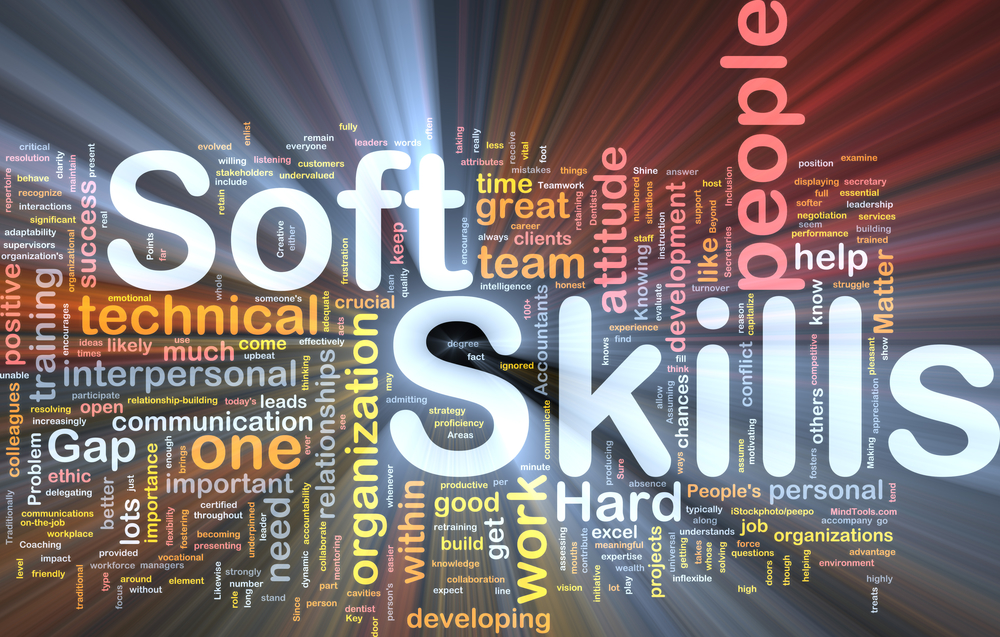 The modern workplace requires greater soft skills and the ability to build interpersonal relationships – especially in remote or hybrid environments. It’s not easy to integrate multigenerational employees into productive teams. Plus, there are other types of diversity that exist in representative workplaces, but it is soft skills that create and sustain real workplace inclusion.
The modern workplace requires greater soft skills and the ability to build interpersonal relationships – especially in remote or hybrid environments. It’s not easy to integrate multigenerational employees into productive teams. Plus, there are other types of diversity that exist in representative workplaces, but it is soft skills that create and sustain real workplace inclusion.
 People who lack interpersonal sensitivity and a capacity for establishing and maintaining trusting and cooperative professional relationships are at a real disadvantage. Even for remote workers, technology allows us to work with each other to accomplish tasks.
People who lack interpersonal sensitivity and a capacity for establishing and maintaining trusting and cooperative professional relationships are at a real disadvantage. Even for remote workers, technology allows us to work with each other to accomplish tasks.
Soft skills come quite easy for some and are harder to grasp for others. Regardless, soft skills can be learned and developed by anyone even though some skills are harder to develop than others. For example, if someone is fundamentally unfriendly that’s not easy to fix via training.
Here are three soft skills that are essential to developing successful professional relationships and building your career.
Communication Skills
The ability to communicate clearly with others strengthens interpersonal relationships, enriches collaboration efforts, and leads to fewer misunderstandings in the workplace. People who communicate well show that they understand the information that others share with them, ask questions for clarification when needed, and clearly express their own thoughts and ideas.
 Listening is a critical part of communication. Being a good listener shows others that you care about what they have to say and that you’re not just waiting until it’s your turn to respond. This gives your coworkers confidence that they’re being listened to and you value their input.
Listening is a critical part of communication. Being a good listener shows others that you care about what they have to say and that you’re not just waiting until it’s your turn to respond. This gives your coworkers confidence that they’re being listened to and you value their input.
Body language speaks volumes, too. Being a good listener is about giving your attention by demonstrating that you are paying attention. That means not focusing on your phone while someone is talking to you, not interrupting, and asking questions that demonstrate you’re interested.
Teamwork Skills
Although we live in an age of rapidly-evolving technology, the ability to effectively collaborate with others is still a valued skill. Working well with others is a key quality in the modern workplace and often requires employees to adapt and communicate differently than they would as individuals. If you’re the “lone-wolf” type (and it’s OK if you are …) then highly collaborative environments probably are not for you. It’s important to be aware of this when searching and interviewing for positions.
 To be a successful team player, you must be able to put the interests of the group before your own, take on roles that are required rather than desired at least some of the time, and show respect for your co-workers.
To be a successful team player, you must be able to put the interests of the group before your own, take on roles that are required rather than desired at least some of the time, and show respect for your co-workers.
Teamwork skills allow people to collaborate, compromise and coordinate their efforts so that each person can bring their own unique strengths together for a common goal.
People who work well with others are often called “synergistic.” They add value to any project, no matter if it’s their own or someone else’s. They find ways to contribute to a team that allows them to complement and build on the strengths of others.
Problem-Solving Skills
Employers are looking for people with a mindset for solving problems. Almost any job interview will include problem-solving questions like:
- Describe a time when you faced an unexpected problem at work and explain how you handled the situation.
- Tell me about a time you had to handle an upset customer or client.
- What do you do in a situation when you cannot seem to find the right solution to a problem?
The ability to see a challenge from multiple angles and identify solutions that fit within an organization’s goals is important in any professional field. In order to get hired, you’ll need to present yourself as a person who can address difficult situations and come up with viable potential solutions.
TIP: If you’re going to an interview, make sure you have specific examples in mind so you are ready to answer these types of questions.
 There are ways to help increase your own problem-solving skills. It isn’t necessarily about technical skills and knowing all the ins and outs of fixing things. Employers pay attention to the kind of attitude you bring to work. Are you proactive about addressing problems instead of ignoring them? Are you only concerned with how you’ll look or who’s to blame? Do you wait for others to identify and address problems?
There are ways to help increase your own problem-solving skills. It isn’t necessarily about technical skills and knowing all the ins and outs of fixing things. Employers pay attention to the kind of attitude you bring to work. Are you proactive about addressing problems instead of ignoring them? Are you only concerned with how you’ll look or who’s to blame? Do you wait for others to identify and address problems?
Professional communication, teamwork, and problem-solving skills are essential for most work roles. People who fail to understand the importance of these soft skills often find themselves struggling in their position and their careers since it’s difficult to fully maximize their potential if coworkers can’t rely on them or they simply can’t work effectively with others.
Do you want to discuss a career, HR, or training-related matter? Reach out today for a free and confidential initial consultation by phone, email, or via direct message on Twitter, Facebook or LinkedIn.
More than career coaching, it’s career psychology®.
I/O Advisory Services Inc. – Building Resilient Careers and Organizations.™



